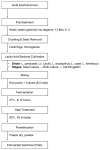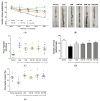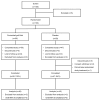Fermented Gold Kiwi Improves Gastrointestinal Motility and Functional Constipation: An Animal Study and Human Randomized Clinical Test
- PMID: 39519611
- PMCID: PMC11547641
- DOI: 10.3390/nu16213778
Fermented Gold Kiwi Improves Gastrointestinal Motility and Functional Constipation: An Animal Study and Human Randomized Clinical Test
Abstract
Constipation is a functional disorder of the gastrointestinal system characterized by difficult bowel movements, infrequent defecation, reduced water content, and hard stools. This study aims to evaluate the preventive effects of fermented gold kiwis (FGK) on loperamide-induced constipation in rats and investigate its efficacy in improving constipation symptoms in human patients through a randomized clinical trial. In the animal study, FGK was administered orally at doses of 50, 125, and 250 mg/kg to constipated rats for two weeks, resulting in significant improvements in constipation parameters. FGK increased serum serotonin and acetylcholine levels and suppressed increases in serum dopamine concentration. FGK also upregulated mRNA expression of the serotonin-synthesizing receptors 5-HT3R and 5-HT4R and suppressed the expression of the dopamine 2-receptor (D2R) in the duodenum. Furthermore, FGK inhibited inflammatory cytokines such as tumor necrosis factor (TNF)-α, interleukin (IL)-1β, and IL-6. In the clinical trials, the improvement in constipation symptoms was evaluated using the gastrointestinal symptom rating scale (GSRS). Clinical trial participants reported significant improvements in constipation symptoms after receiving FGK. These findings suggest that FGK effectively relieves constipation in both animals and humans, indicating its potential as an effective dietary supplement.
Keywords: constipation; fermented gold kiwi; loperamide; neurotransmitter; probiotics.
Conflict of interest statement
Jihye Choi, Hwal Choi, Yuseong Jang, Hyeon-Gi Paik, Bumseok Kim, and Jungkee Kwon are employed by Jeonbuk National University. Hyuck-Se Kwon is employed by Vitech. Seon Mi Shin is employed by Semyung University. Jeung Seung Lee is employed by Daesang Jongga. All authors declare no other competing interests.
Figures













References
Publication types
MeSH terms
Substances
LinkOut - more resources
Full Text Sources
Medical

